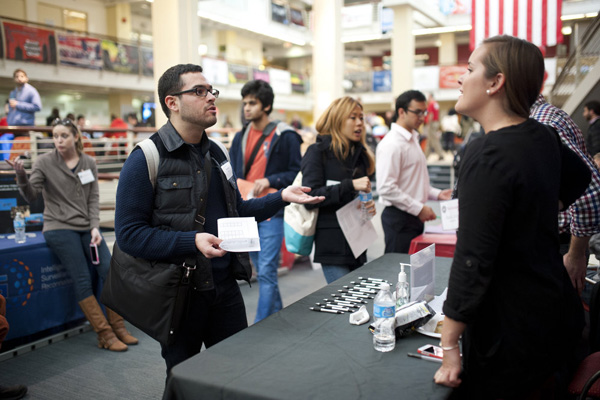Global Entrepreneurship Week 2013 in review

Exciting new ventures, powerful advice for young innovators, and the down-low on Northeastern’s range of resources for entrepreneurs were all on display last week during Global Entrepreneurship Week.
“Global Entrepreneurship Week was a resounding success in bringing together our students, alumni, faculty, and friends who are interested and invested in the entrepreneurial ecosystem here at Northeastern,” said faculty member Dan Gregory, co-director of the Northeastern University Center for Entrepreneurship Education. “I am confident that the discussions and excitement of this week will continue to grow and thrive here on campus and beyond.”
“We’re excited to take what we learned from this year’s events to build a bigger and better Global Entrepreneurship Week in 2014.”
Global Entrepreneurship Week is the world’s largest celebration of innovators and entrepreneurs. More than 130 countries participate in the annual series, which is sponsored by the Kauffman Foundation. At Northeastern, each day of Entrepreneurship Week had a theme based on milestones in the venture process: Monday’s theme was Educate, Tuesday’s was Incubate, and Wednesday’s was Launch.
“This week will shine a bright light on the entrepreneurship and innovation ecosystem we’ve put together here,” said Richard D’Amore, BA’76, co-founder and general partner of North Bridge Venture Partners, at a kickoff reception Monday night. Last year, a record $60 million gift from D’Amore and fellow alumnus Alan McKim, MBA’88, named the D’Amore-McKim School of Business.
In his keynote address, D’Amore noted that entrepreneurship is a clichéd term nowadays. But it’s also one that he said describes perfectly Northeastern’s surging momentum in areas such as use-inspired research, global leadership in experiential education, and creating an entrepreneurial ecosystem across the university.
“What does it mean?” he asked. “My definition is innovation that capitalizes on change to create value. To me, that’s the definition of how Northeastern has driven its progress.”
Throughout the week, attendees learned about student-led efforts such as the venture accelerator IDEA and the Northeastern Entrepreneurs Club, along with examples of how students and faculty have partnered with startups. They were introduced to other resources and programs such as the Center for Research Innovation and the Health Sciences Entrepreneurs program, and they caught a glimpse of exciting new and growing startups developed by students and alumni at Demo Day and NEXPO.
Marc Meyer, the Robert J. Shillman Professor of Entrepreneurship, a Matthews Distinguished University Professor, and founder of Northeastern’s Entrepreneurship and Innovation Group, offered a call to action: for faculty, alumni, industry leaders, and even students to seek out ways to get involved in these programs and initiatives.
Meanwhile, a range of powerful and informative panel discussions throughout the week offered advice and tips for entrepreneurs young and old on a range of topics. They included intellectual property strategies for young startups, how to get early-stage funding, and careers in entrepreneurship. Students and faculty also led panels to outline the range of services and resources available at Northeastern for budding entrepreneurs.
One such event on Wednesday highlighted a critical component to entrepreneurial success: mentoring. In welcome remarks, Terry Fulmer, dean of the Bouvé College of Health Sciences, noted that 1,500 people have participated in the Health Sciences Entrepreneurs program since it was founded in 2006 by Joseph Fleming, PAH ’70, MS ’71. The program focuses on educating students, alumni, and faculty to give them the knowledge and tools to build successful companies.
Keynote speaker Bradley Waugh, president and CEO of Tunstall Americas, explained how his successful career as an entrepreneur and executive in industries ranging from healthcare to financial services and information technology wouldn’t be possible without the support of his mentors—starting with his parents.
He called finding a mentor “the smartest move in business” and stressed the importance of keeping a stocked rolodex to continue building relationships and a network of people from whom to seek advice and bounce ideas.
“A mentor is going to be an individual who can help you in different areas,” he said. “Make sure you pick up the phone and speak to them and listen to them. But they’re not there to make you rich or be successful. Only you have the responsibility to make yourself successful.”





